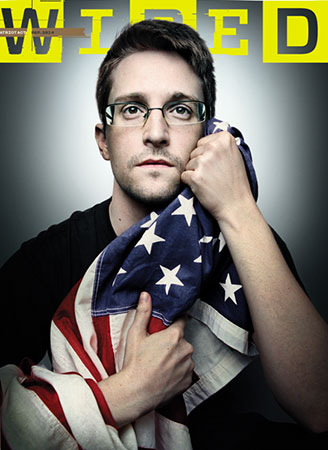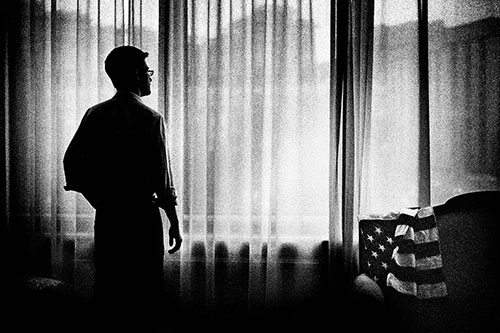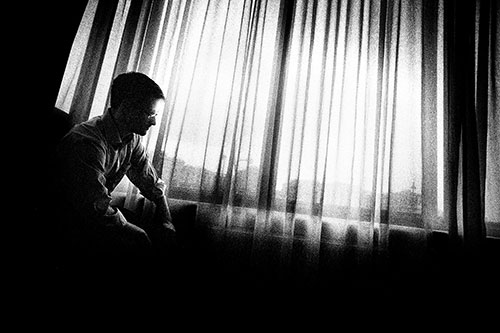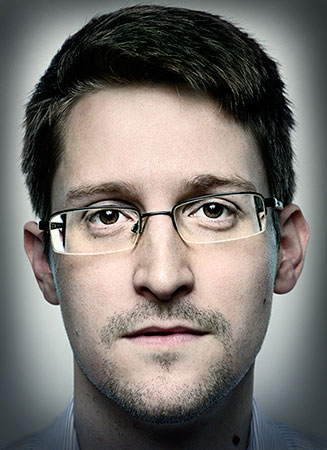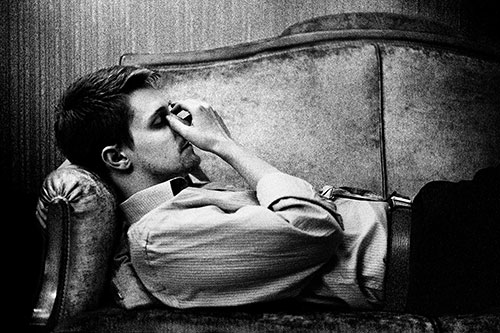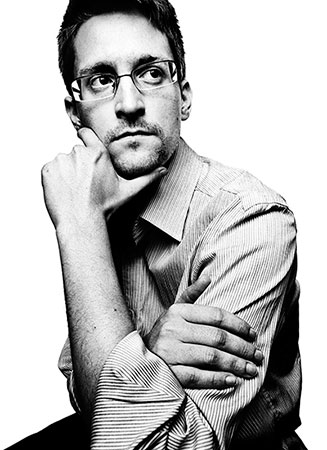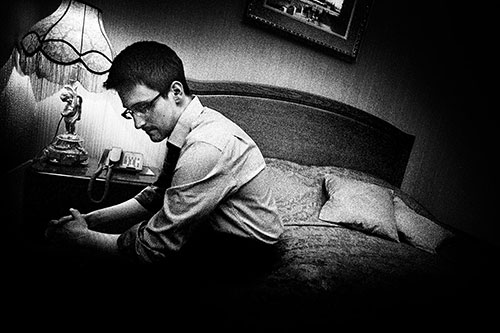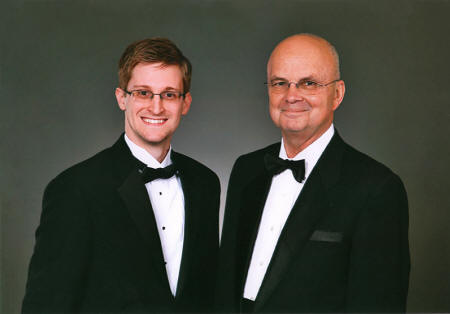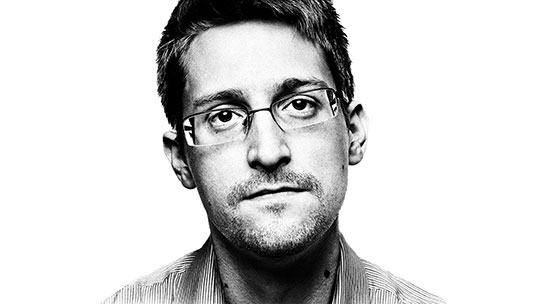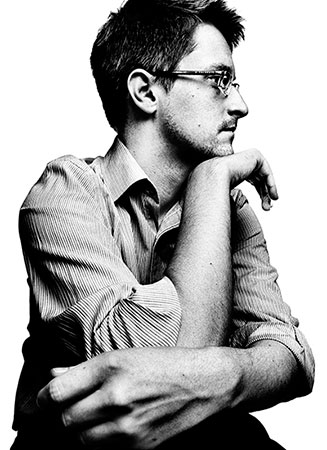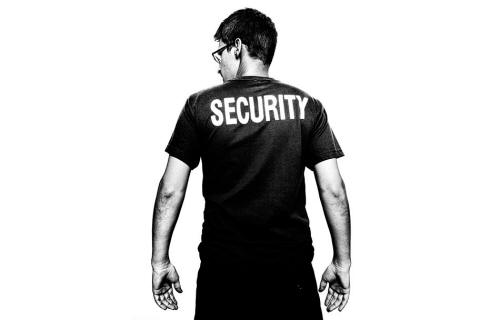|
from
WIRED
Website
'ES' is Edward Snowden, the most wanted man in the world.
For almost nine months, I have been trying to set up an interview with him - traveling to Berlin, Rio de Janeiro twice, and New York multiple times to talk with the handful of his confidants who can arrange a meeting.
Among other things, I want to answer a burning question:
In May I received an email from his lawyer, ACLU attorney Ben Wizner, confirming that Snowden would meet me in Moscow and let me hang out and chat with him for what turned out to be three solid days over several weeks.
It is the most time that any journalist has been allowed to spend with him since he arrived in Russia in June 2013.
But the finer details of the rendezvous remain
shrouded in mystery. I landed in Moscow without knowing precisely where or
when Snowden and I would actually meet. Now, at last, the details are set...
June 13, 2014.
by Platon
Built during the time of Czar Nicholas II, it later became the Second House of the Soviets after the Bolsheviks took over in 1917. In the restaurant, Lenin would harangue his followers in a greatcoat and Kirza high boots.
Now his image adorns a large plaque on the
exterior of the hotel, appropriately facing away from the symbols of the new
Russia on the next block - Bentley and Ferrari dealerships and luxury
jewelers like Harry Winston and Chopard.
I stayed here 20 years ago when I interviewed Victor Cherkashin, the senior KGB officer who oversaw American spies such as Aldrich Ames and Robert Hanssen. And I stayed here again in 1995, during the Russian war in Chechnya, when I met with Yuri Modin, the Soviet agent who ran Britain's notorious Cambridge Five spy ring.
When Snowden fled to Russia after stealing the
largest cache of secrets in American history, some in Washington accused him
of being another link in this chain of Russian agents. But as far as I can
tell, it is a charge with no valid evidence.
Then, as a reservist in law school, I blew the whistle on the NSA when I stumbled across a program that involved illegally eavesdropping on U.S. citizens.
I testified about the program in a closed hearing before the Church Committee, the congressional investigation that led to sweeping reforms of U.S. intelligence abuses in the 1970s. Finally, after graduation, I decided to write the first book about the NSA.
At several points I was threatened with prosecution under the Espionage Act, the same 1917 law under which Snowden is charged (in my case those threats had no basis and were never carried out).
Since then I have written two more books about
the NSA, as well as numerous magazine articles (including two previous cover
stories about the NSA for WIRED), book reviews, op-eds, and documentaries.
When being interviewed at the South by Southwest conference or receiving humanitarian awards, his disembodied image smiles down from jumbotron screens.
For an interview at the TED conference in March, he went a step further - a small screen bearing a live image of his face was placed on two leg-like poles attached vertically to remotely controlled wheels, giving him the ability to "walk" around the event, talk to people, and even pose for selfies with them.
The spectacle suggests a sort of Big Brother in reverse:
Of course, Snowden is still very cautious about arranging face-to-face meetings, and I am reminded why when, preparing for our interview, I read a recent Washington Post report.
The story, by Greg Miller, recounts daily meetings with senior officials from the FBI, CIA, and State Department, all desperately trying to come up with ways to capture Snowden.
One official told Miller:
He wasn't.
And since he disappeared into Russia, the U.S.
seems to have lost all trace of him.
Just past one, Snowden walks by, dressed in dark jeans and a brown sport coat and carrying a large black backpack over his right shoulder.
He doesn't see me until I stand up and walk beside him.
I point to my seat.
He laughs.
When we emerge, he points out a window that overlooks the modern Moscow skyline, glimmering skyscrapers that now overshadow the seven baroque and gothic towers the locals call Stalinskie Vysotki, or "Stalin's high-rises."
He has been in Russia for more than a year now. He shops at a local grocery store where no one recognizes him, and he has picked up some of the language. He has learned to live modestly in an expensive city that is cleaner than New York and more sophisticated than Washington.
In August, Snowden's temporary asylum was set to
expire. (On August 7, the government announced that he'd been granted a
permit allowing him to stay three more years.)
He has on his trademark Burberry eyeglasses,
semi-rimless with rectangular lenses. His pale blue shirt seems to be at
least a size too big, his wide belt is pulled tight, and he is wearing a
pair of black square-toed Calvin Klein loafers. Overall, he has the look of
an earnest first-year grad student.
As we sit down, he removes the battery from his cell phone. I left my iPhone back at my hotel. Snowden's handlers repeatedly warned me that, even switched off, a cell phone can easily be turned into an NSA microphone.
Knowledge of the agency's tricks is one of the ways that Snowden has managed to stay free. Another is by avoiding areas frequented by Americans and other Westerners. Nevertheless, when he's out in public at, say, a computer store, Russians occasionally recognize him.
"Shh," Snowden tells them, smiling, putting a finger to his lips.
Despite being the subject of a worldwide manhunt, Snowden seems relaxed and upbeat as we drink Cokes and tear away at a giant room-service pepperoni pizza. His 31st birthday is a few days away.
Snowden still holds out hope that he will someday be allowed to return to the U.S.
Meanwhile, Snowden will continue to haunt the U.S., the unpredictable impact of his actions resonating at home and around the world.
The documents themselves, however, are out of his control. Snowden no longer has access to them; he says he didn't bring them with him to Russia.
Copies are now in the hands of three groups:
Edward Snowden explains in his own words why he decided to reveal secret details of the domestic surveillance being conducted by U.S. intelligence services.
by Platon
Snowden tells me it doesn't have to be like this.
He says that he actually intended the government to have a good idea about what exactly he stole. Before he made off with the documents, he tried to leave a trail of digital bread crumbs so investigators could determine which documents he copied and took and which he just "touched."
That way, he hoped, the agency would see that his motive was whistle-blowing and not spying for a foreign government.
It would also give the government time to prepare for leaks in the future, allowing it to change code words, revise operational plans, and take other steps to mitigate damage.
But he believes the NSA's audit missed those clues and simply reported the total number of documents he touched - 1.7 million. (Snowden says he actually took far fewer.)
Asked to comment on Snowden's claims, NSA spokesperson Vanee Vines would say only,
Snowden speculates that the government fears that the documents contain material that's deeply damaging - secrets the custodians have yet to find.
Yet it is very likely that no one knows precisely what is in the mammoth haul of documents - not the NSA, not the custodians, not even Snowden himself.
He would not say exactly how he gathered them, but others in the intelligence community have speculated that he simply used a web crawler, a program that can search for and copy all documents containing particular keywords or combinations of keywords.
This could account for many of the documents
that simply list highly technical and nearly unintelligible signal
parameters and other statistics.
But independent of my visit to Snowden, I was given unrestricted access to his cache of documents in various locations. And going through this archive using a sophisticated digital search tool, I could not find some of the documents that have made their way into public view, leading me to conclude that there must be a second leaker somewhere. I'm not alone in reaching that conclusion.
Both Glenn Greenwald and security expert
Bruce Schneier - who have had extensive access to the cache - have
publicly stated that they believe another whistle-blower is releasing secret
documents to the media.
Among the documents the magazine releases is a top-secret "Memorandum of Agreement" between the NSA and the BND from 2002.
Some have even raised doubts about whether the infamous revelation that the NSA was tapping German chancellor Angela Merkel's cell phone, long attributed to Snowden, came from his trough.
At the time of that revelation, Der Spiegel simply attributed the information to Snowden and other unnamed sources.
If other leakers exist within the NSA, it would be more than another nightmare for the agency - it would underscore its inability to control its own information and might indicate that Snowden's rogue protest of government overreach has inspired others within the intelligence community.
The Der Spiegel articles were written by, among others, Laura Poitras, the filmmaker who was one of the first journalists Snowden contacted.
Her high visibility and expertise in encryption may have attracted other NSA whistle-blowers, and Snowden's cache of documents could have provided the ideal cover. Following my meetings with Snowden, I email Poitras and ask her point-blank whether there are other NSA sources out there.
She answers through her attorney:
The same day I share pizza with Snowden in a Moscow hotel room, the U.S. House of Representatives moves to put the brakes on the NSA.
By a lopsided 293-to-123 tally, members vote to halt the agency's practice of conducting warrantless searches of a vast database that contains millions of Americans' emails and phone calls.
It's one of many proposed reforms that never would have happened had it not been for Snowden.
Back in Moscow, Snowden recalls boarding a plane for Hong Kong, on his way to reveal himself as the leaker of a spectacular cache of secrets and wondering whether his risk would be worth it.
Instead, the NSA's surveillance has become one of the most pressing issues in the national conversation.
President Obama has personally addressed the issue, Congress has taken up the issue, and the Supreme Court has hinted that it may take up the issue of warrantless wiretapping.
Public opinion has also shifted in favor of curtailing mass surveillance.
That may be an overstatement, but not by much.
Nearly a year after Snowden's first leaks broke, NSA director Keith Alexander claimed that Snowden was,
More recently, Secretary of State John Kerry said that,
But in June, the government seemed to be backing away from its most apocalyptic rhetoric.
In an interview with The New York Times, the new head of the NSA, Michael Rogers, said he was "trying to be very specific and very measured in my characterizations":
Snowden keeps close tabs on his evolving public profile, but he has been resistant to talking about himself.
In part, this is because of his natural shyness and his reluctance about "dragging family into it and getting a biography." He says he worries that sharing personal details will make him look narcissistic and arrogant.
But mostly he's concerned that he may inadvertently detract from the cause he has risked his life to promote.
by Platon
His mother, Wendy, worked for the U.S. District Court in Baltimore, while his older sister, Jessica, became a lawyer at the Federal Judicial Center in Washington.
His father told me,
It didn't surprise him when his son scored above
145 on two separate IQ tests.
Snowden says reading about myths played an important role growing up, providing him with a framework for confronting challenges, including moral dilemmas.
Soon after Snowden revealed himself as a leaker, there was enormous media focus on the fact that he quit school after the 10th grade, with the implication that he was simply an uneducated slacker.
But rather than delinquency, it was a bout of mononucleosis that caused him to miss school for almost nine months. Instead of falling back a grade, Snowden enrolled in community college.
He'd loved computers since he was a child, but
now that passion deepened. He started working for a classmate who ran his
own tech business. Coincidentally, the company was run from a house at Fort
Meade, where the NSA's headquarters are located.
Like a lot of civic-minded Americans, Snowden was profoundly affected by the attacks.
In the spring of 2004, as the ground war in Iraq was heating up with the first battle of Fallujah, he volunteered for the Army special forces.
Snowden says that he was particularly attracted to the special forces because it offered the chance to learn languages.
After performing well on an aptitude test, he was admitted. But the physical requirements were more challenging. He broke both of his legs in a training accident.
A few months later he was discharged...
But of the Army, Snowden landed a job as a security guard at a top-secret facility that required him to get a high-level security clearance. He passed a polygraph exam and the stringent background check and, almost without realizing it, he found himself on his way to a career in the clandestine world of intelligence.
After attending a job fair focused on intelligence agencies, he was offered a position at the CIA, where he was assigned to the global communications division, the organization that deals with computer issues, at the agency's headquarters in Langley, Virginia.
It was an extension of the network and engineering work he'd been doing since he was 16.
But Snowden quickly discovered one of the CIA's biggest secrets:
The agency was not at all what it appeared to be from the outside.
As the junior man on the top computer team, Snowden distinguished himself enough to be sent to the CIA's secret school for technology specialists.
He lived there, in a hotel, for some six months, studying and training full-time. After the training was complete, in March 2007, Snowden headed for Geneva, Switzerland, where the CIA was seeking information about the banking industry.
He was assigned to the U.S. Mission to the
United Nations. He was given a diplomatic passport, a four-bedroom apartment
near the lake, and a nice cover assignment.
Operatives would get targets drunk enough to land in jail and then bail them out - putting the target in their debt.
While in Geneva, Snowden says, he met many spies who were deeply opposed to the war in Iraq and U.S. policies in the Middle East.
Because of his job maintaining computer systems and network operations, he had more access than ever to information about the conduct of the war.
What he learned troubled him deeply.
He began to consider becoming a whistle-blower, but with Obama about to be elected, he held off.
But Snowden grew disappointed as, in his view, Obama didn't follow through on his lofty rhetoric.
It took a couple of years for this new level of disillusionment to set in.
By that time - 2010 - Snowden had shifted from the CIA to the NSA, accepting a job as a technical expert in Japan with Dell, a major contractor for the agency. Since 9/11 and the enormous influx of intelligence money, much of the NSA's work had been outsourced to defense contractors, including Dell and Booz Allen Hamilton.
For Snowden, the Japan posting was especially attractive: He had wanted to visit the country since he was a teen.
Snowden worked at the NSA offices at Yokota Air
Base, outside Tokyo, where he instructed top officials and military officers
on how to defend their networks from Chinese hackers.
It was bad enough when spies were getting bankers drunk to recruit them; now he was learning about targeted killings and mass surveillance, all piped into monitors at the NSA facilities around the world.
Snowden would watch as military and CIA drones
silently turned people into body parts. And he would also begin to
appreciate the enormous scope of the NSA's surveillance capabilities, an
ability to map the movement of everyone in a city by monitoring their MAC
address, a unique identifier emitted by every cell phone, computer, and
other electronic device.
In 2011 he returned to Maryland, where he spent about a year as Dell's lead technologist working with the CIA's account.
But in March 2012, Snowden moved again for Dell, this time to a massive bunker in Hawaii where he became the lead technologist for the information-sharing office, focusing on technical issues.
Inside the "tunnel," a dank, chilly, 250,000-square-foot pit that was once a torpedo storage facility, Snowden's concerns over the NSA's capabilities and lack of oversight grew with each passing day.
Among the discoveries that most shocked him was learning that the agency was regularly passing raw private communications - content as well as metadata - to Israeli intelligence. Usually information like this would be "minimized," a process where names and personally identifiable data are removed.
But in this case, the NSA did virtually nothing to protect even the communications of people in the U.S..
This included the emails and phone calls of millions of Arab and Palestinian Americans whose relatives in Israel-occupied Palestine could become targets based on the communications.
(The operation was reported last year by The
Guardian, which cited the Snowden documents as its source.)
The document then went on to list six people as
future potential targets. (Greenwald published a redacted version of the
document last year on the Huffington Post.)
In the mid-1970s, Senator Frank Church, similarly shocked by decades of illegal spying by the U.S. intelligence services, first exposed the agencies' operations to the public.
That opened the door to long-overdue reforms, such as the Foreign Intelligence Surveillance Act. Snowden sees parallels between then and now.
He realized, just like Church had before him, that the only way to cure the abuses of the government was to expose them.
But Snowden didn't have a Senate committee at
his disposal or the power of congressional subpoena. He'd have to carry out
his mission covertly, just as he'd been trained.
But Snowden doesn't seem to mind that the interview is stretching into the evening hours. He is living on New York time, the better to communicate with his stateside supporters and stay on top of the American news cycle. Often, that means hearing in almost real time the harsh assessments of his critics.
Indeed, it's not only government apparatchiks that take issue with what Snowden did next - moving from disaffected operative to whistle-blowing dissident. Even in the technology industry, where he has many supporters, some accuse him of playing too fast and loose with dangerous information.
Netscape founder and prominent venture capitalist Marc Andreessen has told CNBC,
Bill Gates delivered a similarly cutting assessment in a Rolling Stone interview.
Snowden with General Michael Hayden at a gala in 2011. Hayden, former director of the NSA and CIA,
defended U.S. surveillance
policies in the wake of Snowden's revelations.
The time when, thumb drive in hand, aware of the enormous potential consequences, he secretly went to work.
The NSA had apparently never predicted that someone like Snowden might go rogue.
In any case, Snowden says he had no problem
accessing, downloading, and extracting all the confidential information he
liked. Except for the very highest level of classified documents, details
about virtually all of the NSA's surveillance programs were accessible to
anyone, employee or contractor, private or general, who had top-secret NSA
clearance and access to an NSA computer.
Well, almost everything...
There was one key area that remained out of his reach: the NSA's aggressive cyberwarfare activity around the world. To get access to that last cache of secrets, Snowden landed a job as an infrastructure analyst with another giant NSA contractor, Booz Allen.
The role gave him rare dual-hat authority covering both domestic and foreign intercept capabilities - allowing him to trace domestic cyberattacks back to their country of origin. In his new job, Snowden became immersed in the highly secret world of planting malware into systems around the world and stealing gigabytes of foreign secrets.
At the same time, he was also able to confirm, he says, that vast amounts of U.S. communications,
He gathered that evidence and secreted it safely
away.
This would have given the NSA access to email and other Internet traffic from much of the country. But something went wrong, and the router was bricked instead - rendered totally inoperable.
The failure of this router caused Syria to
suddenly lose all connection to the Internet - although the public didn't
know that the U.S. government was responsible. (This is the first time the
claim has been revealed.)
They raced to remotely repair the router,
desperate to cover their tracks and prevent the Syrians from discovering the
sophisticated infiltration software used to access the network. But because
the router was bricked, they were powerless to fix the problem.
Back at TAO's operations center, the tension was broken with a joke that contained more than a little truth:
Much of Snowden's focus while working for Booz Allen was analyzing potential cyberattacks from China. His targets included institutions normally considered outside the military's purview.
He thought the work was overstepping the intelligence agency's mandate.
The last straw for Snowden was a secret program he discovered while getting up to speed on the capabilities of the NSA's enormous and highly secret data storage facility in Bluffdale, Utah.
Potentially capable of holding upwards of a yottabyte of data, some 500 quintillion pages of text, the 1 million-square-foot building is known within the NSA as the Mission Data Repository. (According to Snowden, the original name was Massive Data Repository, but it was changed after some staffers thought it sounded too creepy - and accurate.)
Billions of phone calls, faxes, emails,
computer-to-computer data transfers, and text messages from around the world
flow through the MDR every hour. Some flow right through, some are kept
briefly, and some are held forever.
The program, disclosed here for the first time, would automate the process of hunting for the beginnings of a foreign cyberattack. Software would constantly be on the lookout for traffic patterns indicating known or suspected attacks.
When it detected an attack, MonsterMind would
automatically block it from entering the country - a "kill" in cyber
terminology.
That's a problem, Snowden says, because the initial attacks are often routed through computers in innocent third countries.
In addition to the possibility of accidentally starting a war, Snowden views MonsterMind as the ultimate threat to privacy because, in order for the system to work, the NSA first would have to secretly get access to virtually all private communications coming in from overseas to people in the U.S..
(A spokesperson for the NSA declined to comment
on MonsterMind, the malware in Syria, or on the specifics of other aspects
of this article.)
The only question was when...
It was an account of director of national intelligence James Clapper telling a Senate committee that the NSA does "not wittingly" collect information on millions of Americans.
Snowden and his colleagues had discussed the routine deception around the breadth of the NSA's spying many times, so it wasn't surprising to him when they had little reaction to Clapper's testimony.
Snowden decided it was time to hop out of the
water before he too was boiled alive.
But he felt that he had no choice.
Two months later he boarded a flight to Hong
Kong with a pocket full of thumb drives.
I have changed locations and am now staying at the Hotel National, across the street from the Kremlin and Red Square. An icon like the Metropol, much of Russia's history passed through its front doors at one time or another.
Lenin once
lived in Room 107, and the ghost of Felix Dzerzhinsky, the feared chief of
the old Soviet secret police who also lived here, still haunts the hallways.
More than anything, Snowden fears a blunder that will destroy all the progress toward reforms for which he has sacrificed so much.
And so he takes great pains to stay one step ahead of his presumed pursuers - he switches computers and email accounts constantly.
Nevertheless, he knows he's liable to be compromised eventually:
Indeed, some of his fellow travelers have already committed some egregious mistakes.
Last year, Greenwald found himself unable to open the encryption on a large trove of secrets from GCHQ - the British counterpart of the NSA - that Snowden had passed to him.
So he sent his longtime partner, David Miranda, from their home in Rio to Berlin to get another set from Poitras. But in making the arrangements, The Guardian booked a transfer through London.
Tipped off, probably as a result of GCHQ surveillance, British authorities detained Miranda as soon as he arrived and questioned him for nine hours. In addition, an external hard drive containing 60 gigabits of data - about 58,000 pages of documents - was seized.
Although the documents had been encrypted using
a sophisticated program known as True Crypt, the British authorities
discovered a paper of Miranda's with the password for one of the files, and
they were able to decrypt about 75 pages. (Greenwald has still not gained
access to the complete GCHQ documents.)
Nor is he optimistic that the next election will bring any meaningful reform.
In the end, Snowden thinks we should put our faith in technology - not politicians.
The answer, he says, is robust encryption.
Until then, Snowden says, the revelations will keep coming.
Indeed, a couple of weeks after our meeting, The Washington Post reported that the NSA's surveillance program had captured much more data on innocent Americans than on its intended foreign targets.
There are still hundreds of thousands of pages of secret documents out there - to say nothing of the other whistle-blowers he may have already inspired.
But Snowden says that information contained in any future leaks is almost beside the point.
|

